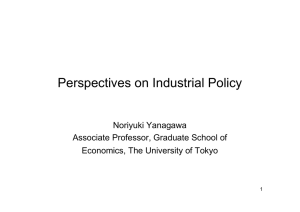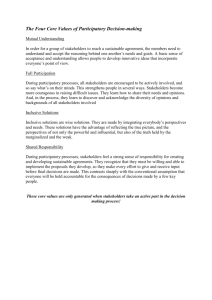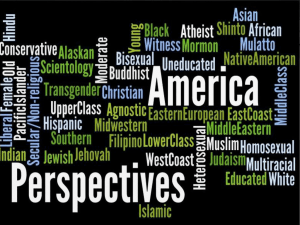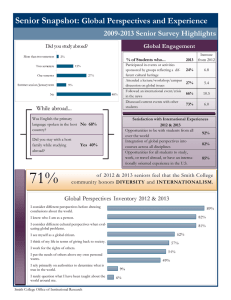Abstract The growing desire to include diverse global perspectives in Development... Research and learning as tools for mainstreaming Global south perspectives
advertisement
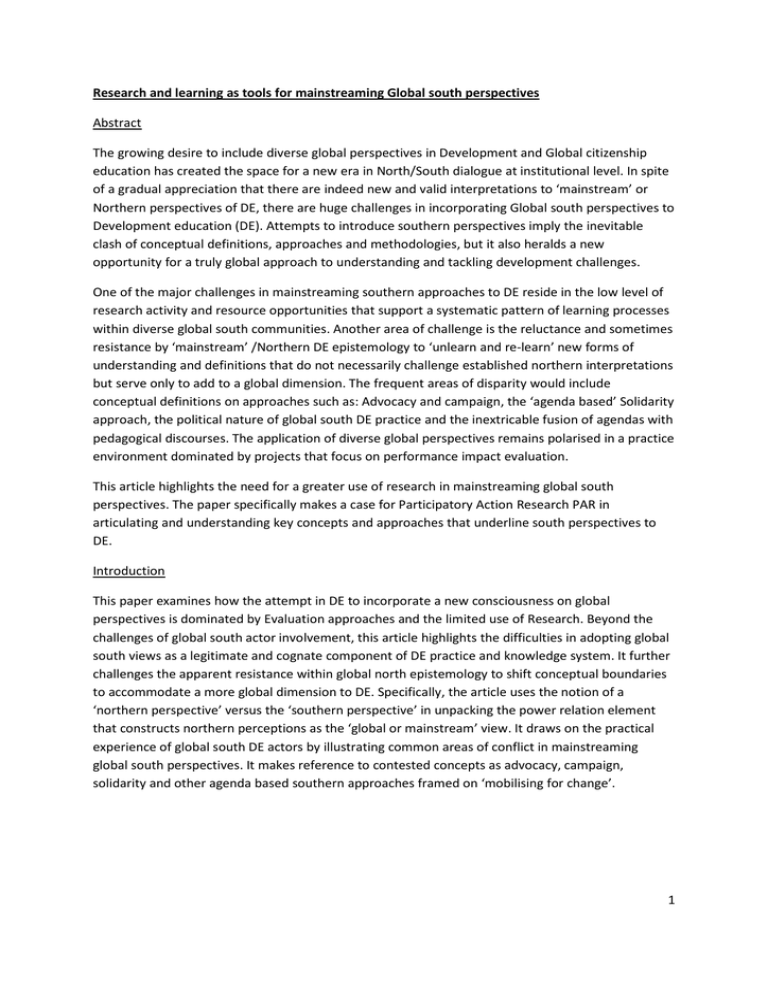
Research and learning as tools for mainstreaming Global south perspectives Abstract The growing desire to include diverse global perspectives in Development and Global citizenship education has created the space for a new era in North/South dialogue at institutional level. In spite of a gradual appreciation that there are indeed new and valid interpretations to ‘mainstream’ or Northern perspectives of DE, there are huge challenges in incorporating Global south perspectives to Development education (DE). Attempts to introduce southern perspectives imply the inevitable clash of conceptual definitions, approaches and methodologies, but it also heralds a new opportunity for a truly global approach to understanding and tackling development challenges. One of the major challenges in mainstreaming southern approaches to DE reside in the low level of research activity and resource opportunities that support a systematic pattern of learning processes within diverse global south communities. Another area of challenge is the reluctance and sometimes resistance by ‘mainstream’ /Northern DE epistemology to ‘unlearn and re-learn’ new forms of understanding and definitions that do not necessarily challenge established northern interpretations but serve only to add to a global dimension. The frequent areas of disparity would include conceptual definitions on approaches such as: Advocacy and campaign, the ‘agenda based’ Solidarity approach, the political nature of global south DE practice and the inextricable fusion of agendas with pedagogical discourses. The application of diverse global perspectives remains polarised in a practice environment dominated by projects that focus on performance impact evaluation. This article highlights the need for a greater use of research in mainstreaming global south perspectives. The paper specifically makes a case for Participatory Action Research PAR in articulating and understanding key concepts and approaches that underline south perspectives to DE. Introduction This paper examines how the attempt in DE to incorporate a new consciousness on global perspectives is dominated by Evaluation approaches and the limited use of Research. Beyond the challenges of global south actor involvement, this article highlights the difficulties in adopting global south views as a legitimate and cognate component of DE practice and knowledge system. It further challenges the apparent resistance within global north epistemology to shift conceptual boundaries to accommodate a more global dimension to DE. Specifically, the article uses the notion of a ‘northern perspective’ versus the ‘southern perspective’ in unpacking the power relation element that constructs northern perceptions as the ‘global or mainstream’ view. It draws on the practical experience of global south DE actors by illustrating common areas of conflict in mainstreaming global south perspectives. It makes reference to contested concepts as advocacy, campaign, solidarity and other agenda based southern approaches framed on ‘mobilising for change’. 1 The article examines the weaknesses of the dominance of evaluation based projects in DE that are largely driven by the desire for accountability, while also highlighting action research as a more sustainable path to facilitating the mainstreaming of southern approaches.1 Context Considerable attention has shifted to the issue of incorporating southern perspectives in development education over the last two decades following the London conference on Development Alternative in 1987. In that conference, participants from developing countries made strong representations in the way the global south was portrayed in educational materials and fund raising messages produced by northern NGOs (Kniep & Danant, 1991:2). Progress has also been made in creating an environment for greater dialogue between northern actors and a ‘southern audience’ both at national and international levels in the last two decades. In Europe, the UK has arguably played a prominent role in exploring new opportunities and approaches that enable wider consultation and involvement of southern actors in DE. Among other initiatives the Open Spaces for Dialogue and Enquiry OSPDE and Though Other Eyes are projects heavily supported by DFID with the aim to improve the methodologies of dialogue and learning in the UK (www.osdemethodology.org.uk; www.throughothereyes.org.uk). Ireland is also charting a similar pattern with the UK through support from Irish Aid and various NGOs, albeit with a more scaled down funding profile. Much of the attempt in furthering global inclusion in DE has however, been pursued through evaluative initiatives than investigative research. What this means precisely is that projects aimed at increasing global dimensions are pursued through measurable input and output components that fit prevailing funding criteria than a means to resolving the existing gaps. This has seen the use of research consigned to attempts to perfect learning processes than its application to promoting wider global partnerships and consultation in DE practice. Evaluation approaches to project are known to serve as a measure of performance against prescribed input and output for the purpose of accountability than learning and capacity building (Fowler, 1997, pp 160-183). Research on the other hand is investigative and serves to legitimise other forms of knowledge that differ from dominant perspectives (Thomas, E. 2000).Initiatives aimed at wider global dimensions are frequently pursued through evaluation frameworks that characterise DE practice particularly, in Ireland where funding guidelines favour a need for measurable project outcomes. Under this regime, model initiatives are designed by ‘experts’ in addressing barriers to global inclusion and pursued through evaluative workshops and seminars undertaken through multiple mini grant projects. This approach to development intervention has continued to enjoy wide appeal in even highly complex social phenomena particularly with the tacit use of conferences and seminars as tools for dialogue and policy articulation. Given the above context, intervention through research based learning processes has gained less prominence as a viable option to promoting better understanding that close the perspectives gaps 1 The word ‘mainstream’ is used only in a generic way to describe dominant perspectives/actors and by no means confer or imply the superiority of one perspective over the other. 2 in dominant ‘northern’ interpretation to the theory and practice of development education. Arguably, it is through the critical analysis of alternative views and recognition of the connections between perspective boundaries that southern interpretations can be mainstreamed. Imperatives of Agenda based approaches to DE By its definition, the word Development connotes an agenda; that of progressive change (Thomas, A. 2000). It is therefore reasonable to argue that development in any form, (education or intervention) is necessarily agenda laden. While education may aim for knowledge and skills in objective and rational judgement, when applied to understanding global inequalities, the issue of an agenda becomes inescapable. It is also logical that for people, who have daily encounters with the brunt of global inequalities, approaches to public action would necessarily reflect those challenges. From a global south standpoint, this logic gives a political essence to DE practice and for southern actors, the challenge is probably how to theorise the ‘agenda’ nature of southern perspectives. Frequently, global south actors would plan their work around specific development issues with an agenda to mobilise action for change at both individual and institutional levels. For example, the Solidarity campaigns on the impact of terrestrial biofuel cultivation on food sovereignty in Columbia, the wider campaigns on fair-trade and the Africa centre’s image intelligence initiative are agenda based issues which bear on global power relations with implications for development. It could be argued that the overarching influence of ‘the principles of education’ over ‘a vision of development’ constantly reinforces the tension between northern approaches and emerging southern approaches to DE practice. This is where the gap in theoretical definitions in DE presents major problems and an area that highlights the need for increased research that builds a wider and more critical understanding among actors. The apparent divergence in conceptual approaches may reside in perspective definitions which are shaped by the urgency of real life experiences and the dictates of global inequalities. Such salient perspective gaps can arguably be addressed through processes that allow increased learning that integrate diverse perspectives towards achieving sustainable global partnerships in challenging the root causes of poverty. However, there are critical questions which remain under-analysed in building the much desired partnership between the global North and global south, some of which includes; what informs southern approaches and perspectives to DE? What constitutes a methodology and is the concept of universality in methodology an abstraction? For the Latin America Solidarity Centre in Dublin for example, Solidarity is much more than a process to an end, it encompasses fundamental values of empathy which is core to its activity. For the Africa centre, a perspective is determined by collective experience than ‘expert defined’ and its approaches are shaped by the dynamics of global power equations, particularly as constructed by the media and other dominant knowledge systems. The environment of contested conceptual boundaries makes investigative approaches central in improving learning and understanding necessary for building more sustainable partnerships in challenging the root causes of poverty and global inequality. Current funding opportunities in the DE sector favour mini grant projects which have clear evaluation benchmarks and the outcomes usually disseminated through follow on Conferences and seminars. However, conference sessions have not been able to sustain the learning circle as they often leave more questions unanswered and 3 sometimes end with a subtle resistance on the pedagogical value of approaches such as Solidarity used by Latin America groups. There are issues around the sustainability and veracity of the Africa centre’s informal Folklore moonlight story telling approach. Similarly, it has become increasingly challenging to establish the validity or indeed legitimacy of issues based or ‘agenda’ laden approaches implicit in southern perspectives in a knowledge system where definitive positions on apparent global injustices/inequalities are deemed anathema to pedagogical processes. Global south actors have often found this position a disconnection from the realities and the urgency of mobilising change at both global and local levels. Evaluation as an intervention tool In the field of development, the word Evaluation has contested meanings. However, some of the earliest and common definitions would describe evaluation as the scientific or quantitative measurement of performance against set objectives (Wiess, 1972p1). More recent theorist like Scriven (1991, p139) define evaluation as the process of determining the merit or value of an action and distinguishes evaluation from measurement in two ways; that measurement is only concerned with descriptive properties and uni-dimentional while evaluation is concerned with merit. Evaluation approaches to social projects have tended to aim more at accountability than an investigation of perceived gaps with marginal value for learning as an intervention tool (Edwards & Hulmes; 1995). Measuring performance means that evaluation necessarily involves the application of specific quantities of inputs against verifiable outputs. Rossi and Freeman’s definition however see evaluation as a proactive programme planning tool (1993, p.5). Evaluation in development intervention gained prominence in the 1980s particularly in the UK and US as project designs took the form of performance audits than stakeholder views (Cronbach et al, 1980). This era described as the Positivist Hegemony saw the rise of cost and benefit analysis in project determination in both public and civil society sectors of development. (Cronbach et al, 1980; Booth, 1988; Rustin, 1998; Henkel, 1991). This model has since proved inadequate in pursuing social intervention of a highly complex nature and uncertainties (ref). It is important to point out that Evaluation is not always about performance management, it can also be used as a learning process in aiding decision making as the next paragraph will attempt to analyse. Evaluation takes two distinct forms; Summative and Formative evaluation (Weiss 1972p.4). Summative evaluations are retrospective and objective oriented (ibid). It is usually undertaken after the completion of a project and serves for accountability with marginal value for learning as an intervention tool (Scriven, 1991). Formative evaluation is on the other hand, exploratory and occurs before a project is undertaken, it serves the purpose of scoping or mapping problems to aid decision making and therefore has a stronger relevance to action research. However, the marginal value of formative evaluations in impact and performance measurement renders it relatively less attractive to funders with emphasis on quantitative outcomes. According to Henkel (1991) quantitative analysis provides prescriptive models to asserting logic in policy, management and measurement of performance. But performance itself is a social construct and therefore there will be issues of attributing and defining impact. The Positivist Hegemony was soon to experience a moderation in popularity when its value in meeting social projects proved increasing inadequate when dealing with highly complex social 4 phenomena. Still, the competing needs for scarce resources in tacking rising social challenges has seen the development sector embrace summative evaluation approaches in DE. For global south actors seeking to apply their perspectives, it has proved very challenging to critically develop and establish the credibility of southern based approaches against the dominant methodologies. The dominance of summative evaluation in the DE arena means that southern operators have to push their agendas within established boundaries where new interpretations/dimension has constrained space to be critically accessed or investigated. In a DE environment built on critical thinking and literacy the implication is that southern operators and their perspective remain on the fringes as the evaluation projects initiatives frequently focus on the symptoms than investigating the root problem. This ‘catch twenty-two’ mirrors precisely the wider global picture of today’s development challenge. While it is established that formative evaluation offers learning opportunities that reduces uncertainty that improve decision making, the point remains that so long as DE claims to proceed from critical thinking and literacy, action research remains a central tool in its theory and practice. It is pertinent to add that Evaluation and Research approaches to intervention are not mutually exclusive rather they can and do complement one another. Research as a learning tool for intervention Research can be understood as a process of systematic information gathering, investigation and analysis that support learning and decision making. As noted earlier, some evaluations are investigative and could form an important part of information gathering process in a research. This implies that research can serve as a social intervention process if it is policy oriented (O’laughlin, 1998; p.107). Global south actors have operated within the framework of summative evaluation based projects with little opportunities for critical learning. While evaluation based projects aim at dealing with immediate symptoms of a problem, Research goes further to investigate the problem environment with a view of understanding wider dynamics of the root problem. It is important to point out that research can take a wide range of forms and it is therefore important to identify the type(s) most suitable for learning in the real life contexts of development education. For both mainstream and global south actors the dominance of summative evaluations has not offered adequate space to explore new meanings that bridge the conceptual gaps between diverse global perspectives. Participatory Action Research PAR would appear most appropriate in linking learning to action (theory to practice) and generating strategies that promote participation (Stinger 1996 as cited in Thomas, E.2000 P.100). While conventional research starts with a literature review and proceeds to a constructed research hypothesis before investigation, PAR ensures an intimate link between practice and action by identifying local needs and priorities (de Koning & Martin1996 p1). PAR would therefore seem uniquely suited to development education because unlike traditional research it starts with the practical problems and lends itself to evaluation research that examine processes. According to Thomas PAR overcomes many of the limitations of measuring inputs and outputs while providing formative evaluation (Thomas, E. p101, 2000). Other advantages of PAR include its focus on practical outcome and learning processes that recognise the gap between concepts, models and perspectives (Grandstaff & Lovelace; 1987). 5 PAR research process: Cyclical process with in-built formative evaluation element Problem investigation External Inputs data collection review/triangulation findings recommend Widening Participation Initiative Review of Strategy: Listening to voices Adapted from Thomas E. 2000 PAR puts the root problem in context by taking into account the experiences of other actors and the investigation process is participatory. The data collection would include formal and informal sources that may include unpublished grey materials. PAR also identifies local needs and gives direction to programme development and service provision while also substituting expert or dominant knowledge with stakeholder experience (de Koning & Martin 1996 p1).It legitimises other forms of knowledge by emphasising stakeholder perspectives and reinforces the value of learning as part of a whole process. Thomas argues that formative evaluation differed from PAR essentially because PAR takes investigation a step further by using participative approaches that empowers stakeholders in a different way (Thomas, E. 2000). It promotes the concept of ‘power with’ rather than ‘power over’ in the relationship between stakeholders and bridges the gap between theoretical knowledge and the experience of practitioners. Three major weaknesses associated with PAR researchers need to be aware of are; the difficulties gaining entry and developing trust, conflicts of interest within target community and its validity as an academic research method. These weaknesses are however not peculiar to PAR, they are a common feature in the field of applied social research. Conclusion The paper identified two major challenges in the current efforts to incorporate global dimensions to DE as; the low level of research and learning that would support a system of knowledge exchange and the reluctance of dominant pedagogies to re-learn through less structured processes. The issues of power relations in agenda setting and tensions in conceptual boundaries were observed as further impediments to meaningful global partnership. Approaches as Solidarity which offer opportunities for greater civic consciousness and participation have remained underexplored as a result of the gap in knowledge reproduction. 6 DE has largely proceeded though Evaluation approaches to intervention than critical learning. This has implications for global south involvement in knowledge production and good practice determination. Evaluation approaches has offered limited opportunities in understanding the dynamics of social processes that influence practice as they tend to serve for performance measurement and upward (funders) accountability. Evaluation approaches has not permitted the critical analysis of perspective definitions of DE concepts, and the influence of development challenges on how perspectives are constructed and approaches conceptualised. The paper sees opportunities to reverse this limitation through the use of Participatory action research that lends itself to formative evaluation, which is a proactive intervention planning tool. PAR was analysed as a social research approach that encourage new forms of knowledge, widens stakeholder participation and enable a more accurate identification of local needs. The paper concludes by suggesting that evaluation and research approaches are not mutually exclusive, rather they are complementary with PAR evolving as a mode of evaluation research. References and list of readings Booth, T. (1988) Developing policy research, Aldershot: Gower Cronbach, L.J et al (1980). Towards reform of program evaluation, San Francisco: Jossey-Bass. FEFC (1997) How to widen participation: A guide to good practice. London: The Stationary Office Chambers, R. (1995) Paradigm shifts and the practice of participatory research and development’, in Nelson, N. and Wright, S. (eds) Power and participatory development, London intermediate technology publications. Edwards, M. and Hulme, D. (1995) ‘Performance and accountability: introduction and overview’, NGOs- Performance and accountability. Beyond the Magic Bullet, London, Earthscan. Fowler, A. (1997) ‘Assessing Development Impact and Organisational Performance’ in Striking a balance: A guide to Enhancing the effectiveness of NGOs in international development, Earthscan Grandstaff, S.W., Grandstaff, T.B. & Lovelace, G. W. (1987). Summary report Proceedings from the International conference in rapid rural approach Khon Kaen University pp5-8 Henkel, M. ( 1991) Government evaluation and change. London: Jessica Kingsley De Koning, K .and Martins, M. (eds) (1996) Participatory research in Health: Issues and experiences O’Laughlin, B. (1998) Interpreting Institutional Discourses in Thomas, Chataway and Wuyts, Finding Out Fast: investigative skills for policy and development Robinson, M. and Thin N. (1993) Project evaluation: A Guide for NGOs, Glasgow: Overseas development Administration Joint Funding Scheme, NGO Unit 7 Rossi, Lipsey and Freeman (2003) Evaluation a systematic approach 7th edition Sage publication London Scriven, M. (1991) Evaluation Thesaurus 4th edition, Sage publication London Thomas, E (2000) ‘Bums on seats’ or ‘listening to voices’: evaluating widening participation initiatives using participatory action research in Studies in continuing education vol.22, no1 2000; PG TU870 Capacities for Managing Development, The Open University 2002 Thomas, A. (1996) ‘What is development management?’ Journal of international development 8(1):95-110 Weiss, C. (1972) as cited in Thomas, L and Thomas, A. Evaluation: Performance, Learning and Sustainability TU870; SUP 678756: Capacities for managing development Open University 2001 www.osdemethodology.org.uk www.throughothereyes.org.uk 8
